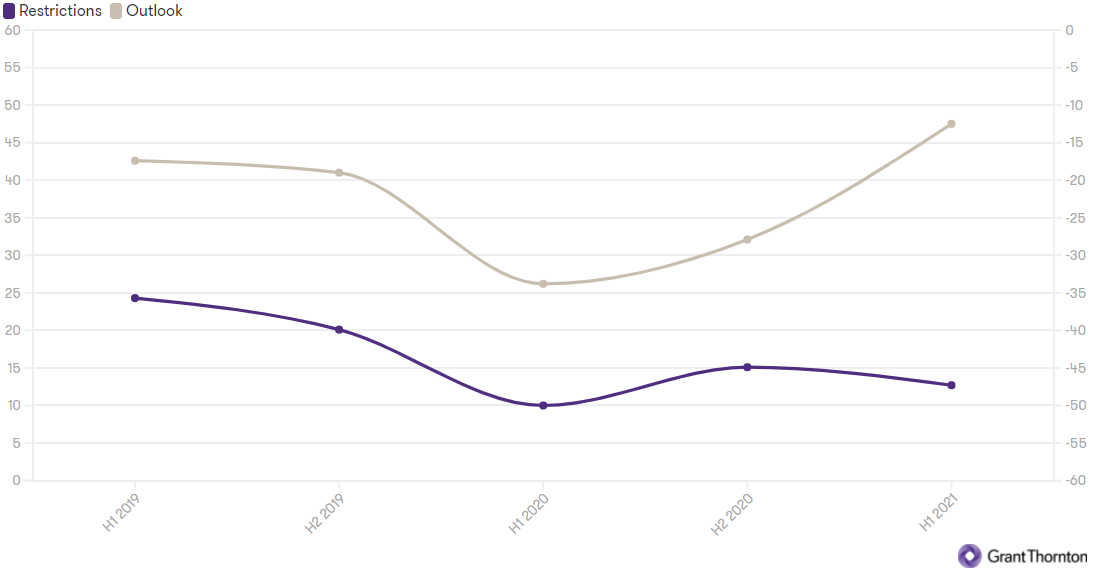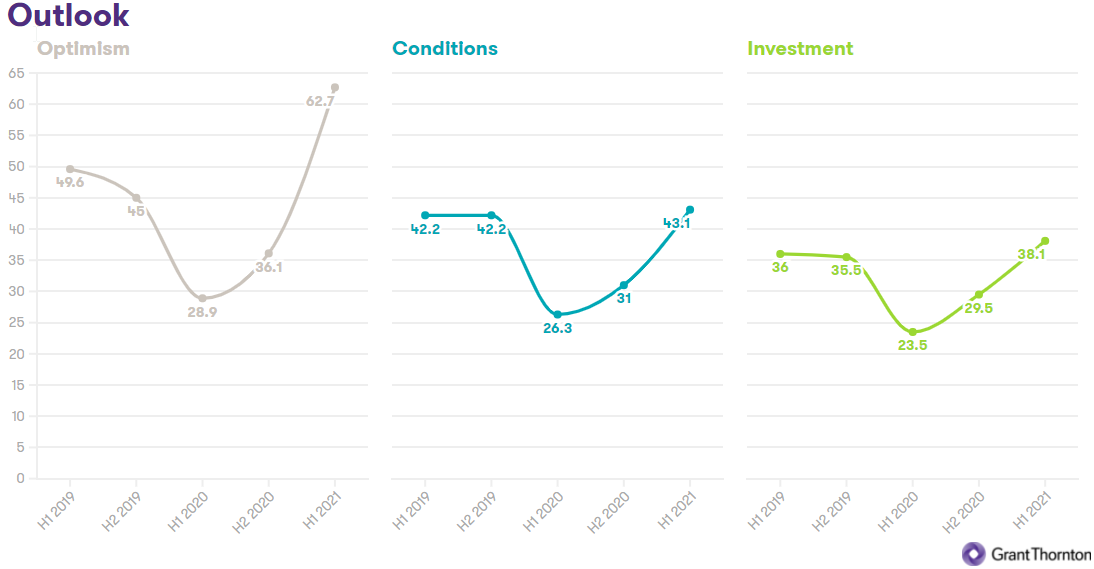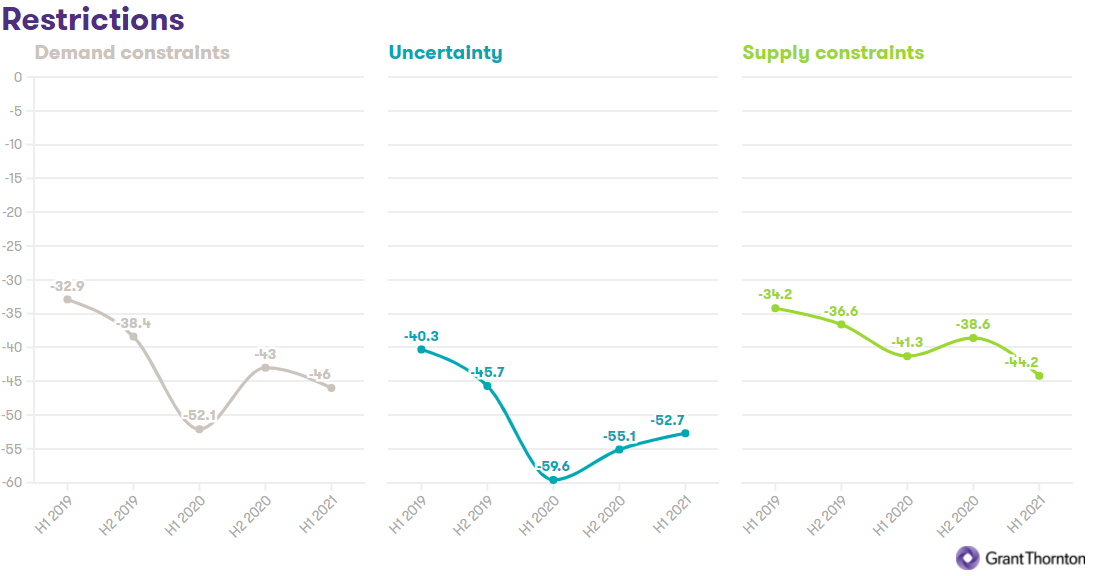
European businesses are upbeat on successful vaccination rollout
Global business pulse
Vaccine programmes have given the mid-market high hopes
Business health in the EU turned positive in H1 2021, following a previous half of muted optimism as the region faced rising COVID-19 case numbers and winter lockdowns. Vaccine programmes have given the mid-market high hopes for recovery and growth in the first half of the year, albeit from a low base. Meanwhile, the opening up of economies elsewhere in the world has buoyed expectations for international trade.
But the mid-market is also looking at the challenges ahead, identifying the demand for skills as a critical focus. Many businesses are focusing on investment in technology to help broaden access to talent and manage employees, giving them the tools to be productive. Businesses also see technology facilitating international growth as virtual processes continue to develop, accelerated by the pandemic.
 The index has recovered to 0.1, up 6 points from H2 2020 and a slightly greater improvement than the global average. All EU countries included in the Global Business Pulse saw an improvement in the index.
The index has recovered to 0.1, up 6 points from H2 2020 and a slightly greater improvement than the global average. All EU countries included in the Global Business Pulse saw an improvement in the index.
Larissa Keijzer, regional head of EMEA at Grant Thornton International Ltd., says: "Businesses are really benefiting from the fact that vaccination, even though it started slowly in some European countries, has come through in most of the region. In some countries, there's a very high vaccination willingness, and this is helping economies to recover."
Pent up demand and optimism boosts business outlook
The outlook, which measures growth expectations against restrictions, recovered strongly, lifting 15 points from H2 2020 to 47, six points above pre-COVID-19 levels. Having improved in H2 2020 from the nadir of the first wave of the pandemic, restrictions have slipped back - dragged down by deteriorating supply and demand constraints.
Conditions and investment continued to improve from the previous half, while optimism in the EU surged 27 points to 63%. This represents a significant change in sentiment following a modest pick-up in the second half of last year. Irish businesses were the most optimistic, with 76% saying they were slightly or very confident about the next 12 months, while Swedish companies saw the most significant shift in sentiment, jumping 44 percentage points (pp) to 75%.

Larissa says she sees and hears business optimism everywhere, and the mid-market is getting very busy in Europe. The pent-up demand that grew through lockdowns is releasing and is a vital driver of optimism and activity. She says: "Germany is one of those countries that has a lot of mid-market companies, and also a lot of family businesses. What is very different about family businesses is that they normally don't let go of their people when the economy sinks. They try to do less, but they always try to keep their people. And all those people have been saving money because they have kept their jobs.”
Mid-market businesses seek international opportunities near and far
With businesses eyeing the trade prospects within and outside Europe, the mid-market is upbeat. More than one-third of firms now expect to increase exports over the next 12 months, up 11pp from H2 2020 and a series high.
Export expectations in Germany and Spain jumped furthest, up 13pp to 34% and 45% respectively. Export intentions reflected the share of firms expecting to increase revenues from non-domestic markets and rises in the number of employees focused on those markets - up 9pp to 28%.
In contrast to six months ago, when trade flows were thin and there were still regular disruptions to supply chains, the story is more hopeful. Larissa says: "You now see that not only are businesses optimistic, but there is also the appetite to go abroad. And the mid-market in Europe sees many opportunities to grow further within the region itself, which is remarkable because Europe has often focused on the more distant markets in the past. This is also what you see in the Americas and Asia Pacific, with businesses seeing their own region as growth markets, and that will be interesting to follow."
Germany benefits from a lot of intra-European trade. "German businesses are experiencing the demand and the opportunities to export and import. Germany is seen as a very stable country from a political perspective, and that will also help as other regions and countries spot opportunities to trade with Germany."

European mid-market businesses are also looking to increase investment to enhance these trade opportunities and accelerate export growth. Investment intentions in the region were up across all categories but were particularly strong in skills and technology.
Investment expectations in skills jumped 13pp to 45%. Among Spanish businesses, 43% expect to spend more on staff skills, a lift of 14pp, while German and Italian businesses were up 13%.
Regionally, technology investment intentions were up 10pp to 47%, a level not seen since Q2 2018. 53% of Spanish businesses expected to boost technology spending a leap of 19pp outstripping regional peers.
Larissa says: "Many firms have invested in technology and hybrid working. It's much easier to export without having to be present everywhere. The advice to invest in technology, people and internationalisation has really come through, and it remains an important pillar of potential growth. It’s a winning combination."
A shortage of skills could hold back growth, while leaders need to be alive to approaching ESG requirements
Successful vaccination programmes have improved regional uncertainty but it continues to fall well short of the longer-term average, up only 2pp to -53. Overall, restrictions deteriorated further, driven mainly by supply constraints, while demand constraints also worsened.
Concerns over the availability of skilled workers were in the front of business leaders' minds; the number of businesses citing skills as a constraint jumped to a series high of 51%. The problem is most acute in Germany, where growth exacerbates demand for talent; 59% of German businesses expressed concern, a lift of 15pp.

Various industries, including travel and tourism, have been hardest hit by the pandemic and the impact on its labour base. Larissa says: "A lot of people have moved to other industries during COVID-19. Some have gone to healthcare, others to administration jobs, and many have not returned to hotels and leisure. So the potential growth of that sector is checked by the challenge of getting the people."
"In 2021 so many companies are talking about the war for talent. But this isn’t only about acquiring new talent, it's also about retention. The turnover of people has become huge. There is a lot of talent on the market, but you need to be an attractive employer to hire those people."
Many businesses also cited access to finance as a constraint on growth, which was up from 34% to 39%. This was largely driven by German business, 47% of which said they were concerned by the supply of funds, a jump of 15pp and a record high.
One issue that could impact the mid-market as they turn attention to growth is the non-financial audit directive, due to come into play at the end of the year.
Larissa says: "A non-financial audit will be required for any upscale company – about 55,000 in Europe – on non-financial reporting topics such as sustainability. We see many court cases happening now, particularly with companies that have not embraced sustainability."
While this puts a burden on businesses, compliance is an opportunity that plays to business efforts to secure the vital skills needed. Larissa adds: "The pool of talent is not interested in working for a company that is not making sustainability part of their business plan and priorities. People want companies to take action, and while this starts with corporates, there will be a big demand on mid-market companies to prioritise this as well."
Regional Highlights
Please contact our expert Andrew Dickson to understand how we can help your business through the challenges or opportunities ahead.